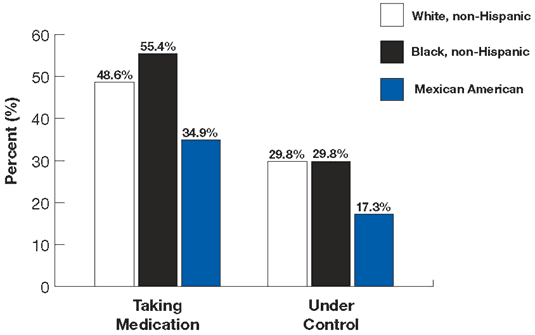Cardiovascular Emergencies Part I (1.5 Hours)
People with Hypertension Who Are Being Treated with Medications and/or Have the Condition Under Control, by Race/Ethnicity, 1999–2002*

*Age-adjusted to the 2000 U.S. standard population. People with hypertension are those with a systolic pressure ≥ 140 mm Hg or a diastolic pressure ≥90 mm Hg, or those taking antihypertensive medication. People with hypertension under control are those who were told that their blood pressure was high, but who have lowered it to <140/90 mm Hg. Source: CDC. MMWR 2005;54(1):7–9.
Risk Factors
Blood Cholesterol Levels
Cholesterol is a waxy substance produced by the liver or consumed in certain foods. It is needed by the body, and the liver makes enough for the body's needs. When there is too much cholesterol in the body—because of diet and the rate at which the cholesterol is processed—it is deposited in arteries, including those of the heart. This can lead to narrowing of the arteries, heart disease, and other complications. Some cholesterol is often termed "good," and some often termed "bad." A higher level of high–density lipoprotein cholesterol, or HDL, is considered "good," and gives some protection against heart disease. Higher levels of low–density lipoprotein, or LDL, are considered "bad" and can lead to heart disease. A lipoprotein profile can be done to measure several different forms of cholesterol, as well as triglycerides (another kind of fat) in the blood.
High Blood Pressure
High blood pressure is another major risk factor for heart disease. It is a condition where the pressure of the blood in the arteries is too high. There are often no symptoms to signal high blood pressure. Lowering blood pressure by changes in lifestyle or by medication can lower the risk of heart disease and heart attack.
Diabetes Mellitus
Diabetes also increases a person's risk for heart disease. With diabetes, the body either doesn't make enough insulin, can't use its own insulin as well as it should, or both. This causes sugars to build up in the blood. About three–quarters of people with diabetes die of some form of heart or blood vessel disease. For people with diabetes, it is important to work with a healthcare provider to help in managing it and controlling other risk factors.
Tobacco Use
Tobacco use increases the risk of heart disease and heart attack. Cigarette smoking promotes atherosclerosis and increases the levels of blood clotting factors, such as fibrinogen. Also, nicotine raises blood pressure, and carbon monoxide reduces the amount of oxygen that blood can carry. Exposure to other people's smoke can increase the risk of heart disease even for nonsmokers.
Diet
Several aspects of peoples' dietary patterns have been linked to heart disease and related conditions. These include diets high in saturated fats and cholesterol, which raise blood cholesterol levels and promote atherosclerosis. High salt or sodium in the diet causes raised blood pressure levels.
Physical Inactivity
Physical inactivity is related to the development of heart disease. It also can impact other risk factors, including obesity, high blood pressure, high triglycerides, a low level of HDL (good) cholesterol, and diabetes. Regular physical activity can improve risk factor levels.
Obesity
Obesity is excess body fat. It is linked to higher LDL (bad) cholesterol and triglyceride levels and to lower HDL (good) cholesterol, high blood pressure, and diabetes.
Alcohol
Excessive alcohol use leads to an increase in blood pressure, and increases the risk for heart disease. It also increases blood levels of triglycerides which contributes to atherosclerosis.
Heredity
Heart disease can run in the family. Genetic factors likely play some role in high blood pressure, heart disease, and other vascular conditions. However, it is also likely that people with a family history of heart disease share common environments and risk factors that increase their risk.
